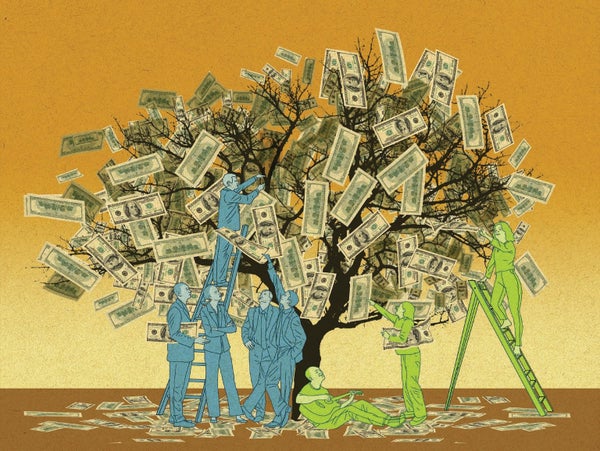One of the most damaging logical fallacies is the “fallacy of the excluded middle,” also known as a false dichotomy or false binary—the ploy of presenting a problem as either/or with no other choices and no middle ground. It's often used to make people reject something they want by persuading them they can't have it unless they give up something else they want even more. An example is the supposed trade-off between jobs and the environment.
Since 1984 the Gallup polling group has been asking the following question: “With which one of these statements about the environment and the economy do you most agree—protection of the environment should be given priority, even at the risk of curbing economic growth (or) economic growth should be given priority, even if the environment suffers to some extent?” Antienvironmental forces exploit this dichotomy. For example, while on the campaign trail during the United Auto Workers strike last fall, Donald Trump said, “You can be loyal to American labor, or you can be loyal to the environmental lunatics, but you can't really be loyal to both. It's one or the other.”
Most Americans are not lunatics, but they care a lot about the environment, and there is obvious public interest in fresh air, clean water, and beautiful places to walk and rest. So antienvironmental politicians and polluting industries rely on a dichotomous framing to claim that in trashing environmental protection, they are protecting something more valuable: jobs.
On supporting science journalism
If you're enjoying this article, consider supporting our award-winning journalism by subscribing. By purchasing a subscription you are helping to ensure the future of impactful stories about the discoveries and ideas shaping our world today.
In fact, numerous studies show that protecting the environment is not bad for the economy. In the 1980s—soon after landmark federal statutes such as the Clean Air and Clean Water Acts were passed—some studies suggested that the economic slowdown in that decade was caused by environmental legislation.
But better, larger and longer-term studies completed since then have refuted that claim. For example, one study found that productivity at stringently regulated oil refineries in the heavily controlled Los Angeles air basin increased during the study period—1987 to 1992—whereas refinery productivity decreased in other regions. A recent review of the peer-reviewed literature concluded that “environmental regulations have had very little effect on employment in the regulated industry.” In other words, environmental protection does not kill jobs.
What is more, many environmentally destructive jobs are notoriously short-lived. Mineral extraction is famously associated with boom-and-bust economics—think “gold rush”—and several studies have shown that the fracking “boom” of the early 2000s has already gone bust. In his 2021 book, Up to Heaven and Down to Hell: Fracking, Freedom, and Community in an American Town, Colin Jerolmack reports that the actual number of jobs that were created by the industry was often far less than claimed, and many of them proved ephemeral. The Multi-State Shale Research Collaborative found that “firms with an economic interest in the expansion of drilling” and their allies systematically exaggerated its impact on employment.
For instance, in 2012 the U.S. Chamber of Commerce claimed that fracking in Pennsylvania, Ohio and West Virginia had created more than 300,000 new jobs. But the Pennsylvania Department of Labor and Industry counted only about 18,000 in core industries and about 5,600 in ancillary industries, and according to the nonprofit Ohio River Valley Institute, little of the income they generated stayed in local communities. In contrast, environmental restoration creates jobs in projects that typically employ local laborers, use mostly local materials and, because they support tourism and recreation, often yield durable benefits.
Environmental protection is also good for public health, which in turn is good for the economy, because sick people generally can't work well and sometimes can't work at all. A study published in the journal Science last November estimated that nearly half a million deaths in the U.S. could be attributed to fine particulate air pollutants from coal-fired power plants between 1999 and 2020.
It's not just that being exposed to toxic chemicals and polluted air and water is bad—something we've known for centuries—but also that time spent in nature is good. Although the details can be hard to pinpoint, various studies and reviews have documented positive effects of a clean and green environment, particularly on mental health, cognition and blood pressure.
One of the unintended negative consequences of COVID-19 lockdowns for some people might have been the adverse effect of being stuck indoors. A review study published in 2022 found that exposure to nature during the COVID pandemic was associated with lower levels of depression, anxiety and stress and with greater happiness and life satisfaction.
Nature exposure was also “correlated with less physical inactivity and fewer sleep disturbances.” During lockdowns, many people spent more time than usual outdoors. Recovery and resilience in future public health crises, the authors of this review concluded, “might be improved with nature-based infrastructure, interventions, designs and governance.”
So next time that you hear someone assert that it's either the economy or the environment, don't believe it. And let's hope that the good folks at Gallup will realize that it's time to ditch this damaging false dichotomy.
This is an opinion and analysis article, and the views expressed by the author or authors are not necessarily those of Scientific American.
